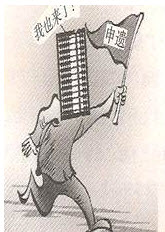When the United States and Korea(SOK) announced their new free-trade agreement last month, the news was mainly economic. The deal would give American farmers and bankers alike better access to Korean consumers and help Korean companies push more electronics, cars and textiles into the United States. Largely unreported was the political angle--the U.S.-Korea(SOK) free trade agreement comes at precisely the moment when America’s military presence on the Korean Peninsula is rapidly diminishing, anti-U.S. nationalism in Korea(SOK) is growing and China is playing an ever more important leadership role in the region. This FTA is much more significant in strategic than economic terms.
It is the same about any number of trade deals in Asia these days. While free-trade agreements have always been somewhat political, solidifying national relationships, the use of FTAs in geopolitical jockeying(竞赛) is reaching new heights in East Asia. Since 1997, the number of FTAs in the region has risen from seven to 38. Last time we saw this sort of frenzied bilateral activity was back in the 1930s. That worries some economists, who fear that all the free-trade politicking will further erode an already beleaguered global trading system, and create a snowball effect of countermeasures.
It’s no accident that the activity in the region has increased since 2004, which marked the beginning of a massive free trade agreement between China and the Association of Southeast Asian Nations. China offered countries like Laos and Cambodia an "early harvest," unilaterally opening up markets for hundreds of different kinds of agricultural products. That in turn helped smooth the way for a reduction in tension in hot spots like the disputed South China Sea territories. FTAs are becoming a key instrument for great-power diplomacy.
That worries rivals, who are rushing to find their own partners. The Japanese, for example, have always been cautious when it comes to bilateral agreements. Japanese Prime Minister Shinzo Abe recently announced a new push for more Japanese FTAs in the region. Meanwhile, the EU is trying desperately to push its way back into the region, recently announcing plans to negotiate its own deals with both South Korea and the ASEAN nations.
How will all the wheeling and dealing end Not with more efficient trading. A recent map of Asian trade deals shows an increasingly complicated "spaghetti bowl" hindering broader global efforts to liberalize trade. Such deals have a disproportionately negative effect on small and medium-sized enterprises, representing as much as 80 percent of jobs in some parts of Asia. Already, the U.S.-Korea(SOK) deal is causing grousing(不满) in Japan, which would take a hit as Korean competitors no longer have. to deal with U.S. tariffs. Still, that probably won’t turn the tide -- the most important criterion in motivating a country to seek FTAs, well ahead of economic reform, was--surprise --politics.
According to some economists, the rapidly increasing number of FTAs has the lurking hazard of ()
A. corrupting the prosperous world economy system
B. causing problems to the already troubled world economy
C. creating a snowball effect of anti-FTA measures
D. hindering broader global efforts to liberalize trade

